Ireland Travel Tips: Making the Most of Your Emerald Isle Escape
Planning a trip to Ireland? Here is a list of Ireland Travel Tips to help you get organized.
Taking a holiday in Ireland is a great choice; I know I’m biased as I live here. Our country is beautiful and packed with historical landmarks and scenic open countryside. These Ireland Travel tips have been put together to give you as much information as possible to make your journey hassle-free. If you are visiting alone, read my tips on taking a Solo Trip to Ireland.
I hope you enjoy this list of Ireland Travel Tips and find them helpful.
Table of Contents
Ireland Travel Tips
Research Visa Requirements
One of our Top Ireland Travel Tips is researching visa requirements before booking your tickets. Different countries have different visa requirements for entering Ireland. Based on your nationality, you can determine whether you need a visa.
Check the official website of the Irish Naturalisation and Immigration Service (INIS) or the Irish embassy or consulate in your country for up-to-date visa information.
Ireland offers various types of visas, including short-stay visas for tourism, business, or visiting family and friends and long-stay visas for study, work, or joining family members.
Ensure you meet the eligibility criteria for the type of visa you intend to apply for. This may include proof of sufficient funds, travel insurance, accommodation arrangements, and a valid passport.
Visa processing times can vary depending on your country of residence and the type of visa you are applying for. Plan and apply for your visa well before your travel dates to avoid any last-minute complications.
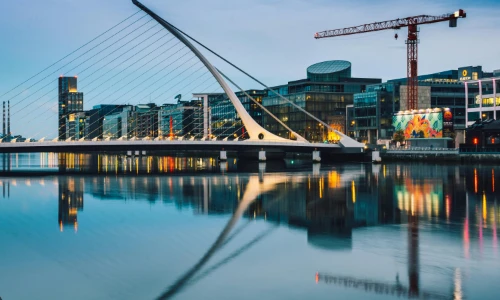
Pack for Variable Weather
Our next tip on our Ireland Travel Tips is to pack for various Irish weather. When preparing for a trip to Ireland, packing for variable weather is essential due to the country’s famously unpredictable climate. To navigate Ireland’s ever-changing weather conditions, it’s wise to pack a versatile wardrobe that caters to rain and shine.
Start by including layers that can be easily added or removed according to the temperature fluctuations. This might entail packing lightweight tops, long-sleeved shirts, sweaters, and a waterproof jacket or windbreaker. Opt for wool or synthetic fibres that provide warmth even when damp.
Sturdy walking shoes are indispensable for exploring Ireland’s rugged landscapes, whether trekking through the countryside or wandering cobblestone streets in the city. Additionally, waterproof footwear ensures comfort during rainy spells.
Accessories such as scarves, hats, and gloves can provide extra warmth when needed. At the same time, sunglasses and sunscreen are indispensable for sunny days, even infrequent.
Lastly, pack a compact umbrella or a poncho that can easily fit into your daypack. While Ireland’s weather may be unpredictable, being prepared ensures you can enjoy the beauty of the Emerald Isle, rain or shine.
Know the Currency Exchange
Continuing our list of Ireland Travel Tips, we can say that it is vital to keep your finances organised. When travelling to Ireland, it’s essential to familiarize yourself with the currency used and understand how currency exchange works to manage your finances effectively. Ireland uses the euro (€) as its official currency, denoted by the symbol € and abbreviated as EUR.
Before your trip, consider exchanging some of your home currency for euros to have cash on hand upon arrival. You can exchange currency at airports, banks, and currency exchange offices or use ATMs widely available throughout Ireland. However, potential fees and exchange rates should be considered when using ATMs abroad.
Inform your bank of your travel plans to avoid issues with international transactions. Additionally, consider carrying a mix of payment methods, including cash, credit cards, and debit cards, for added flexibility.
While many establishments in Ireland accept credit and debit cards, especially in urban areas, having cash on hand benefits smaller purchases in rural areas where card acceptance may be limited.
By planning and understanding currency exchange options, you can ensure a seamless financial experience during your travels in Ireland. Ireland uses the euro (€). Have some cash on hand for smaller purchases, as not all places accept cards, especially in rural areas.
Driving Tips for Ireland
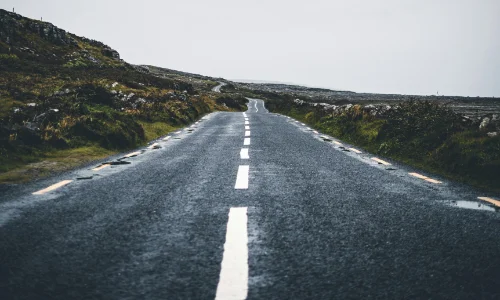
Important on our list of Ireland Travel Tips is knowing the “rules of the road” when visiting Ireland. Driving in Ireland can be a rewarding experience. Still, it’s essential to familiarize yourself with the local driving customs, rules of the road, and safety tips to ensure a smooth journey:
Driving Orientation: In Ireland, vehicles drive on the left side of the road, with the driver seated on the right-hand side of the car. This may be unfamiliar for drivers from countries where driving is on the right side, so take extra caution, especially when making turns or navigating roundabouts.
Speed Limits: Speed limits in Ireland are typically posted in kilometres per hour (km/h). The standard speed limits are 50 km/h in urban areas, 80 km/h on regional roads, and 100-120 km/h on national roads and motorways. Be vigilant and adhere to speed limits, as speed cameras are prevalent, and fines for speeding can be hefty.
Road Signs and Markings: Familiarize yourself with Irish road signs and markings, which may differ from those in your home country. Pay close attention to signage indicating speed limits, directions, and potential hazards.
Drink Driving Laws: Ireland has strict laws regarding driving under the influence of alcohol. The legal blood alcohol limit is lower than in many other countries, so it’s safest to avoid alcohol entirely if you plan to drive.
Seatbelt Laws: Seatbelt use is mandatory for all passengers in vehicles in Ireland, including those seated in the back. Ensure that everyone in the vehicle wears their seatbelt at all times.
Roundabouts: Roundabouts are common in Ireland and are used to manage intersections. Yield to traffic already in the roundabout and give way to vehicles approaching from your right. Always signal your intentions when entering or exiting a roundabout.
Narrow Roads: Many roads in rural Ireland, especially in the countryside, can be narrow and winding. Exercise caution, especially when encountering oncoming traffic. Be prepared to yield or reverse if necessary to allow other vehicles to pass.
Parking: Pay attention to parking regulations, as unauthorized parking may result in fines or towing. Use designated parking areas and be mindful of any parking restrictions indicated by signage.
Emergency Services: In an emergency, dial 112 or 999 for assistance. Be prepared to provide your location and details of the situation to emergency responders.
Explore Public Transportation
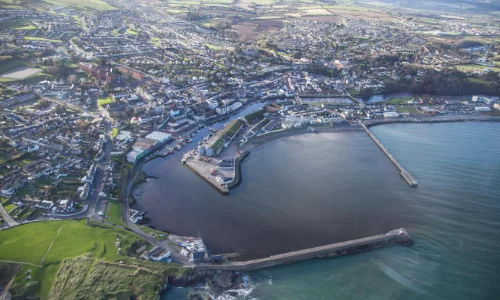
Explore the Irish Public Transport system is one of the most recommended tips on our list of Ireland travel tips. Public transportation in Ireland offers convenient and efficient options for travellers looking to explore the country without the hassle of driving. Here’s a guide to navigating Ireland’s public transportation system:
Trains: Ireland’s rail network, operated by Irish Rail (Iarnród Éireann), connects major cities and towns. The Dublin to Cork, Dublin to Galway, and Dublin to Belfast routes are famous for travellers. Trains are comfortable and punctual and offer scenic views of the Irish countryside. Consider purchasing tickets in advance to secure lower fares, especially during peak travel times.
Buses: Bus Éireann operates an extensive bus network that serves both urban and rural areas in Ireland. Inter-city coaches connect major cities, towns, and villages, making it easy to reach destinations inaccessible by train. City buses are available in larger urban centres like Dublin, Cork, Galway, and Limerick, providing convenient transportation within city limits.
Luas: The Luas is Dublin’s light rail system, consisting of two lines: the Green Line and the Red Line. The Luas offers quick and reliable transportation within Dublin, connecting commuters and tourists to key destinations such as city centre attractions, suburbs, and business districts.
DART: The Dublin Area Rapid Transit (DART) is a coastal train service that runs along the coast of Dublin Bay, offering scenic views of the coastline. The DART connects suburban areas to Dublin’s city centre and beyond, making it a convenient option for exploring coastal towns and attractions.
Leap Card: For seamless travel on public transportation in Ireland, consider purchasing a Leap Card, a rechargeable smart card that offers discounted fares on buses, trains, and the Luas in Dublin and Cork. The Leap Card can be easily topped up and used for pay-as-you-go travel or as a multi-day pass, offering convenience and savings for travellers.
Ferries: If you plan to explore Ireland’s offshore islands or travel between Ireland and the UK, consider taking a ferry. Ferries operate between Ireland and Britain and to islands such as the Aran Islands, Inishbofin, and the Skellig Islands, providing unique travel experiences and stunning coastal views.
Taxis and Ride-Sharing: Besides public transportation, taxis and ride-sharing services like Uber are available in urban areas and can provide convenient transportation for short distances or when public transportation is not readily accessible.
Book Accommodations in Advance
On our list of Ireland Travel tips, we always recommend booking your accommodation in advance. Booking accommodations in advance is crucial in planning a trip to Ireland, offering numerous benefits that enhance the overall travel experience. Here’s why securing your lodging ahead of time is highly recommended:
Availability: Ireland is a popular tourist destination, particularly during peak seasons such as summer and around holidays like St. Patrick’s Day. By booking accommodations in advance, you ensure you have a wide selection of options, from hotels and guesthouses to bed and breakfasts, self-catering cottages, and even unique accommodations like castles and manor houses. This reduces the risk of struggling to find suitable lodging upon arrival, especially in high-demand areas.
Cost Savings: Booking accommodations in advance often allows travellers to secure lower rates than last-minute bookings. Many hotels and accommodations offer early booking discounts or promotional deals, providing an opportunity to save money on lodging expenses. Additionally, by planning, you can compare prices across different properties and take advantage of special offers or package deals that may be available.
Peace of Mind: Knowing that your accommodations are confirmed and secured alleviates stress and uncertainty, allowing you to focus on enjoying your trip to the fullest. With lodging arrangements in place, you can shift your attention to planning other aspects of your itinerary, such as sightseeing, dining experiences, and activities, with the assurance that you have a comfortable place to stay each night.
Preferred Locations: Booking accommodations in advance gives you the advantage of choosing your preferred location based on your travel itinerary and interests. Whether you wish to stay in the heart of a bustling city, near scenic coastal areas, or amidst tranquil countryside settings, securing your lodging beforehand ensures you can select accommodations that best suit your needs and preferences.
Pack Essentials
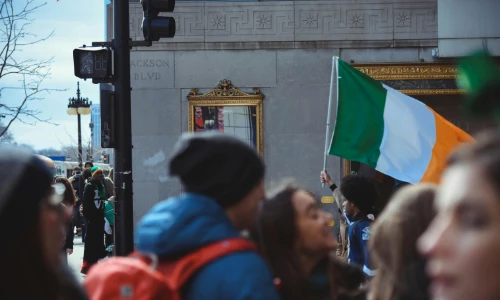
Next on our list of Ireland Travel Tips is our recommendation to pack all the essentials needed for your journey to Ireland. Packing essentials is crucial for a comfortable and enjoyable trip to Ireland. Beyond clothing suitable for variable weather, consider including items that enhance convenience and sustainability throughout your journey. Here are some must-pack essentials:
- Universal Adapter: Ireland’s electrical outlets typically use the Type G plug with three rectangular prongs. A universal adapter allows you to charge your electronic devices without worrying about compatibility, ensuring you stay connected during your travels.
- Reusable Water Bottle: Ireland boasts numerous clean water taps, making it easy to refill your water bottle on the go. Carrying a reusable water bottle helps reduce plastic waste. It ensures you stay hydrated throughout your adventures, whether exploring cities or hiking scenic trails.
- Rain Gear: Given Ireland’s unpredictable weather, packing a lightweight, waterproof jacket or poncho is essential for staying dry during sudden rain showers. Consider bringing a compact umbrella to shield yourself from the elements while exploring outdoor attractions.
- Comfortable Shoes: Whether strolling through cobblestone streets in Dublin or hiking along rugged coastal paths, comfortable walking shoes are necessary. Opt for sturdy footwear that provides support and traction, allowing you to explore Ireland’s diverse landscapes easily.
- Travel Documents: Keep your passport, travel insurance information, accommodation reservations, and any necessary visas organized in a secure travel wallet or document holder. Having essential documents easily accessible ensures a smooth and stress-free travel experience.
- Portable Power Bank: Pack a portable power bank to keep your electronic devices charged while on the go. Whether you capture memorable moments with your camera or navigate with your smartphone, a power bank provides peace of mind, especially during long days of exploration.
By packing these essentials, you’ll be well-prepared to embrace everything Ireland offers, from bustling cities to picturesque countryside, ensuring a memorable and comfortable travel experience.
Discover Hidden Gems
Moving along on our Ireland Travel Tips, we highly suggest you do your best to discover hidden gems throughout Ireland. While Ireland is renowned for its iconic attractions like the Cliffs of Moher and the Guinness Storehouse, the true magic of the Emerald Isle lies in its hidden gems waiting to be discovered. Venture off the beaten path to uncover the lesser-known treasures that showcase Ireland’s rich history, stunning landscapes, and vibrant Irish culture.
Explore charming villages tucked away in the countryside, where time seems to stand still, and traditional Irish hospitality thrives. Wander through narrow streets lined with colourful cottages, stumble upon quaint pubs echoing with lively music sessions, and engage with locals eager to share stories of their heritage.
Discover ancient ruins and archaeological sites scattered across the Irish landscape, each with its tale to tell. From mystical stone circles and medieval castles to hidden monastic settlements, these historic sites offer a glimpse into Ireland’s fascinating past and provide a sense of wonder and awe.
Embark on scenic drives along coastal roads and winding country lanes, where breathtaking vistas unfold at every turn. Marvel at dramatic cliffs plunging into the Atlantic Ocean, tranquil lakes reflecting emerald green hills, and rugged mountains shrouded in mist. Take leisurely walks along secluded beaches, explore hidden caves, and soak in the serenity of Ireland’s unspoiled natural beauty.
Immerse yourself in local traditions and cultural experiences that showcase Ireland’s heart and soul. Attend traditional music sessions in cosy pubs, participate in ancient Celtic festivals and rituals, and indulge in farm-to-table dining experiences celebrating the land’s bounty.
By embracing the spirit of exploration and seeking out Ireland’s hidden gems, you’ll uncover a world of enchantment and authenticity that will leave a lasting impression on your travel experience. Whether it’s stumbling upon a hidden waterfall, a hidden waterfall, or a hidden waterfall, Ireland’s hidden gems await your discovery.
Respect Local Customs
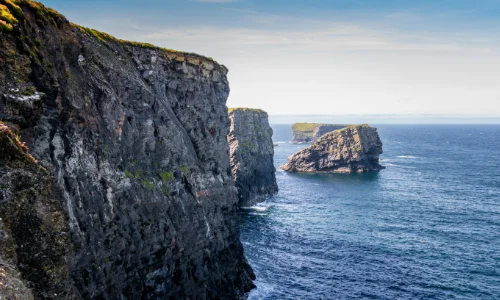
Respecting local customs is critical to immersing yourself in Ireland’s rich culture and heritage while forging meaningful connections with its people is next on our list of Ireland travel tips. Take the opportunity to learn a few Gaelic phrases, such as “Dia duit” for hello and “Go raibh maith agat” for thank you, as a gesture of respect for the Irish language and its significance in the country’s identity.
Furthermore, familiarize yourself with local customs and traditions, including the pivotal role of pubs as social hubs in Irish communities. Pubs are not merely places to drink but serve as gathering spots for locals to share stories, music, and laughter. Embrace the convivial atmosphere of Irish pubs, start conversations with fellow patrons, and savour the camaraderie permeating these establishments. If you are visiting Cork then make sure to visit on of the pubs on my list of best pubs in Cork.
By embracing Gaelic phrases and respecting the importance of pubs in Irish culture, you’ll deepen your appreciation for Ireland’s customs and foster genuine connections with warm and welcoming people. Respecting local traditions demonstrates your admiration for Ireland’s heritage and enriches your travel experience with authenticity and camaraderie.
Buy Health Insurance
When travelling to Ireland, it’s crucial to prioritize your health and well-being by ensuring you have comprehensive travel insurance that covers medical emergencies. While Ireland boasts excellent healthcare facilities, unexpected illnesses or accidents can occur, and medical expenses abroad can be costly. Therefore, having adequate travel insurance provides peace of mind and financial protection in the event of unforeseen medical circumstances.
Before your trip, review your travel insurance policy to ensure it offers comprehensive coverage, including medical expenses, emergency medical evacuation, and repatriation. Confirm that your policy extends to activities you plan to engage in, such as hiking or adventure sports.
Additionally, familiarize yourself with the European emergency number 112, which can be dialled free of charge from any phone in Ireland in case of emergencies. Knowing this number ensures prompt access to emergency services, including medical assistance, police, and fire services.
Furthermore, take the time to locate nearby medical facilities, including hospitals, clinics, and pharmacies, in the areas you plan to visit. Keep a list of these facilities and any necessary contact information if you require medical assistance during your travels.
By prioritizing health insurance, knowing the European emergency number, and identifying local medical facilities, you can confidently enjoy your trip to Ireland, knowing you’re prepared for any medical emergencies.
Preserve Nature when Visiting Ireland
Preserving Ireland’s natural landscapes is essential to maintaining the country’s breathtaking beauty and ecological diversity for future generations. As you explore Ireland’s pristine countryside, it’s imperative to adhere to Leave No Trace principles, which promote responsible outdoor ethics and minimize human impact on the environment.
Follow these guidelines to help preserve Ireland’s natural treasures:
- Pack it in, pack it out: Carry out all waste, including food wrappers, bottles, and other litter. Dispose of waste properly in designated trash receptacles or take it to dispose of later.
- Stay on designated trails: Stick to established trails and paths to prevent trampling vegetation and damaging fragile ecosystems. Avoid venturing off-trail, especially in sensitive habitats like bogs, wetlands, and dunes.
- Respect wildlife: Observe wildlife from a distance and refrain from feeding or approaching animals. Avoid disrupting their natural behaviours and habitats to minimize stress and disturbance.
- To minimize campfire Impacts: Camp in established fire rings or designated campfire areas. Adhere to local fire regulations and ensure fires are fully extinguished before leaving the area.
- Leave natural objects untouched: Refrain from picking flowers, disturbing rocks, or removing natural artefacts from their environment. By leaving them undisturbed, you can preserve the integrity of natural landscapes for others to enjoy.
- Reduce your carbon footprint: Opt for eco-friendly transportation options, such as walking, cycling, or public transportation, to minimize carbon emissions and reduce environmental impact.
- Educate others: Share Leave No Trace principles with fellow travellers and encourage them to practice responsible outdoor ethics. By raising awareness and promoting conservation efforts, we can collectively protect Ireland’s natural beauty for future generations.
By following these principles and respecting Ireland’s natural landscapes and wildlife habitats, you can help preserve the country’s pristine environment and ensure its beauty remains unspoiled for years. Together, we can enjoy the wonders of Ireland’s outdoors while safeguarding its ecological integrity.
Tipping Etiquette in Ireland
While tipping is not as customary in Ireland as in some other countries, it is appreciated in certain situations, particularly in restaurants where service is exceptional. As a general guideline, leaving a tip of 10-15% of the total bill is considered a gesture of appreciation for good service.
However, it’s important to note that tipping is discretionary, and there is no obligation to leave a tip if you’re dissatisfied with the service. Additionally, some restaurants may include a service charge on the bill, so check before leaving an additional tip.
While tipping etiquette in Ireland may differ from that in other countries, showing gratitude for exceptional service through a modest tip is always welcomed and appreciated.
Enjoy Local Irish Cuisine
When visiting Ireland, indulging in the local cuisine is essential for a truly authentic experience. Delight your taste buds with traditional Irish dishes such as hearty Irish stew, made with tender meat, potatoes, and vegetables simmered in a rich broth. Pair it with freshly baked soda bread, a staple of Irish baking known for its dense texture and slightly tangy flavour.
For seafood lovers, sample creamy seafood chowder, brimming with a medley of fresh fish, shellfish, and savoury broth. It’s a comforting and satisfying dish that showcases Ireland’s abundant coastal bounty.
To complement your meal, savour the flavours of Ireland’s iconic beverages, including a pint of Guinness, the country’s famous stout known for its creamy texture and rich flavour. Or, opt for a glass of smooth and flavorful Irish whiskey distilled with centuries of craftsmanship and tradition.
By embracing traditional Irish cuisine and beverages, you’ll embark on a culinary journey that celebrates the country’s culture, heritage, and culinary prowess, leaving you with unforgettable tastes and memories of your time in Ireland. For more information on the best places to eat read my articles on the Best Restaurants in Cork or my post on the Best Restaurants in Dublin.
Stay Safe while Visiting Ireland
While Ireland is generally a safe destination for travellers, it’s essential to exercise caution, particularly in crowded tourist areas where petty crime and antisocial behaviour may occur. Keep the following safety tips in mind during your visit:
- Stay Vigilant: Be aware of your surroundings, especially in crowded places such as tourist attractions, markets, and public transportation hubs. Watch your belongings and be cautious of pickpockets.
- Secure Your Valuables: Keep your belongings secure at all times, preferably in a crossbody bag or a money belt, and avoid displaying valuable items such as jewellery or expensive electronics in public.
- Stay Connected: Ensure your mobile phone is charged and accessible in emergencies. Consider sharing your itinerary and contact details with a trusted friend or family member.
- Use Licensed Taxis: When using taxis, opt for licensed operators and avoid accepting rides from unmarked or unofficial vehicles. Confirm the fare with the driver before starting your journey.
- Avoid Walking Alone at Night: Try to avoid walking alone in poorly lit or isolated areas. Stick to well-lit and populated streets, especially when returning to your accommodation after dark.
By staying vigilant and following these safety precautions, you can enjoy your time in Ireland with peace of mind, knowing that you’re taking necessary steps to ensure your safety and well-being during your travels.
Familiarize yourself with Emergency Services
Continuing with safety in mind on our list of Ireland Travel Tips, we ask that you familiarise yourself with our emergency services contact details. Before embarking on your journey to Ireland, you must familiarize yourself with emergency services to ensure your safety and well-being while travelling. Memorize the European emergency number 112, which provides access to police, medical, and fire services in emergencies.
Additionally, take the time to locate nearby medical facilities and police stations in the areas you plan to visit. Being prepared and knowing how to access emergency services can provide peace of mind and swift assistance should the need arise during your travels in Ireland.
Learn about Festivals and Events
Immerse yourself in the vibrant tapestry of Irish culture by learning about the diverse festivals and events throughout the year. From traditional music festivals to lively celebrations of arts, literature, and food, Ireland offers many cultural experiences for visitors to enjoy.
Plan your trip around these events to witness the country’s rich heritage firsthand and connect with locals in a festive atmosphere. Whether the St. Patrick’s Day Parade in Dublin or the Galway International Arts Festival, participating in Ireland’s festivals promises unforgettable memories and a deeper appreciation for the country’s unique cultural identity.
Check Holiday Schedules
Be mindful of public holidays when planning your trip to Ireland, as they may impact the availability of attractions and services. Check holiday schedules in advance to avoid disappointment and plan accordingly.
Some attractions, shops, and restaurants may have altered operating hours or closures on public holidays. By staying informed about holiday schedules, you can optimize your itinerary and ensure a seamless travel experience, allowing you to make the most of your time exploring Ireland’s rich cultural heritage and scenic landscapes.
Respect Historic Sites
As you explore Ireland’s rich history and heritage, respecting its historic sites is essential. These sites hold cultural significance and deserve to be treated with reverence. Follow any guidelines or restrictions, such as staying on designated paths, refraining from touching or climbing on ancient structures, and disposing of waste properly.
By respecting historical sites, you preserve their integrity for future generations and honour the stories and traditions that have shaped Ireland’s identity. Immerse yourself in the beauty and history of these sites while leaving behind only footprints and memories.
Stay Connected
Staying connected during your travels in Ireland is essential for navigating new places, staying in touch with loved ones, and accessing helpful information on the go. Consider purchasing a local SIM card upon arrival, which offers cost-effective mobile data plans and allows you to make calls and access the internet using a local phone number. Alternatively, check with your mobile provider about international roaming options, although these may incur higher fees.
Additionally, take advantage of the widespread availability of free Wi-Fi in many locations across Ireland. Hotels, cafes, restaurants, and tourist attractions often offer complimentary Wi-Fi access to patrons. Public transportation services, including buses and trains, also provide free Wi-Fi on board, allowing you to stay connected while commuting between destinations.
Access to mobile data or free Wi-Fi hotspots makes navigating unfamiliar terrain easy, researching nearby attractions, and sharing your travel experiences with friends and family in real time. Stay connected and make the most of your adventures in Ireland with the convenience of modern technology at your fingertips.
Shop Local
In Ireland, embrace the community spirit and support local artisans and businesses by shopping locally for souvenirs and gifts. Explore bustling markets, charming boutiques, and artisanal shops to discover unique treasures that reflect the country’s culture and craftsmanship.
Whether it’s handcrafted pottery, traditional woollens, or artisanal foods and beverages, shopping local not only allows you to bring home authentic souvenirs of your trip but also contributes to the sustainability of local economies and preserves the cultural heritage of Ireland.
By choosing to shop local, you’ll not only find one-of-a-kind treasures but also make a positive impact on the communities you visit.
Embrace the Journey
As you journey through Ireland, embrace the enchanting beauty and warmth of its landscapes and people. Slow down, breathe in the fresh air, and immerse yourself in the captivating scenery. From lush green countryside to rugged coastal cliffs, Ireland’s landscapes beckon you to pause and savour the moment.
Engage with locals, share stories over a pint of Guinness, and revel in the genuine hospitality that Ireland is known for. Embrace the journey with an open heart and a sense of wonder, and you’ll discover the true magic and charm that make Ireland an unforgettable destination.
In summary, visiting Ireland offers many unique experiences, from its beautiful scenery to its exciting culture and friendly people. Following these essential travel tips, you can explore Ireland without any worries.
Whether trying tasty Irish food, finding hidden spots, or joining in local traditions, every moment is a chance to enjoy Ireland’s magic. So, prepare to pack your bags, respect the land and its people, and have an incredible time making memories in this special place full of stories and legends. Have a safe and fun adventure in Ireland!
For more information on Irish culture why not read my article on some the Best Irish Poets in Ireland.
